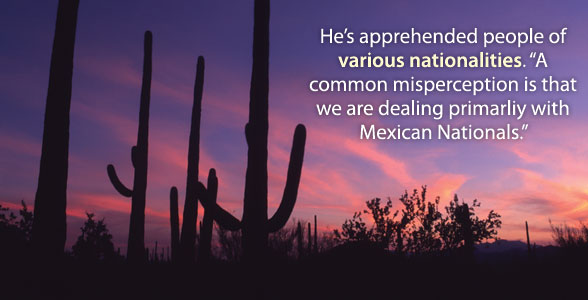Tracking a group of 200 illegal aliens in the remote Sonoran Desert may not sound like your typical day’s work, but U.S. Border Patrol agent Chris Frazier finds it “frightening, exciting, and frustrating.”
“It involves a great deal of stamina and a good balance of all my senses,” says the Knoxville native and 1997 UT Knoxville public relations grad, who works in the Tucson, Arizona, sector.
Frazier says he knew before he graduated that he wanted a career in law enforcement. “After looking into several agencies, I chose the Border Patrol because of the dynamic atmosphere the job is structured around,” he says. “The BP is not simply a nine-to-five job. It changes greatly from day to day. I have the opportunity to work in extremely remote areas, which generally present a high level of danger.”
Arizona’s 370-mile border with Mexico is one of the busiest areas for immigrant smuggling. More than half of all illegal immigration into the U.S. comes through Arizona, so, Frazier says, Border Patrol agents are outnumbered by those trying to sneak into the U.S. “Usually only two or three Border Patrol agents are tracking a single group. There’s very little or no backup due to the lack of manpower,” he says. “Tracking a group can take from one hour up to nearly twenty hours.
“After my partner and I have spent hours tracking a group and finally apprehend them in a remote area of the desert, we then have to relay our coordinates via GPS to be found by air units,” he says. “This can be challenging in that we have to control a large group of people for many hours. On occasion, my partner and I have tracked groups of illegal aliens as large as two hundred.” With no roads in the vicinity, Frazier says it’s problematic to transport the detainees.
Narcotic smugglers also are on his list of suspects: “The narcotics smugglers travel in much smaller groups, usually five to fifteen people, each carrying forty- or fifty-pound bundles of narcotics.” They are “far more cunning,” he says. “They use tactics such as wrapping their shoes in carpet, traveling only at night, brushing out their foot sign–and they generally carry weapons.”
He recalls an incident where he and his partner jumped a group of marijuana smugglers, only to realize they were outnumbered 4 to 1.
“As we turned our flashlights on and identified ourselves, they dropped their bundles and scattered into the mountainside. As we collected the bundles, we came across a weapon. We turned off our lights, gathered the narcotics, and immediately called a Black Hawk helicopter for transportation.”
Frazier says he’s apprehended people of many nationalities, not just Mexicans. “A common misperception is that we are dealing primarily with Mexican nationals. But I’ve arrested people from South and Central America, China, Russia, Pakistan, and Jamaica.”
His is a dangerous line of work, but Frazier says he’s only had minor injuries, like sprains and bruises.
Even though illegal immigration is a hot-button issue among many Arizona citizens, Frazier says Border Patrol agents don’t take sides. “Within my field, hostility toward illegal immigrants doesn’t exist.”
Frazier thinks better technology and an influx of National Guardsmen have contributed to recent decreases in arrests. The Border Patrol estimates that it detains one out of every four illegal immigrants, and their fate depends on their prior record.
“Usually, each illegal alien is electronically fingerprinted and the fingerprints are submitted to a national criminal and immigration database,” he says. “If we find there is no criminal violation, the illegal alien is returned to their country of origin. But if we find there is a prior criminal or immigration violation, further steps are taken according to the violation in question.”
Despite the dangers and challenges, Frazier enjoys his work. He says the Border Patrol has given him a strong foundation in law enforcement and an opportunity to grow in a dynamic field.
“Honestly, I didn’t know what to expect when I went through the academy. But the job has proved to be much more fulfilling than I could have ever hoped. To me this is exciting because I’m working not just to protect the nation’s borders, I’m also doing something physically and mentally challenging.”



